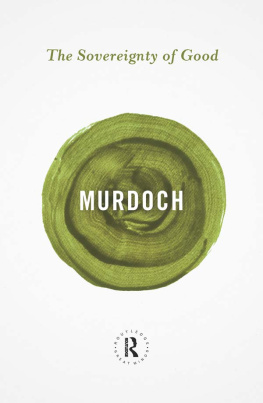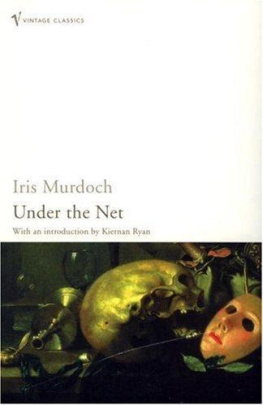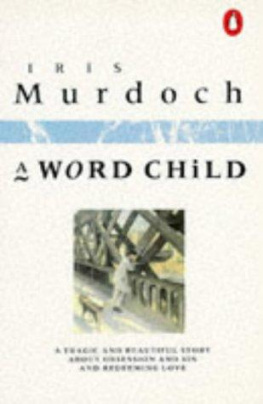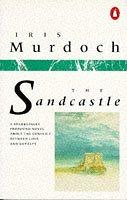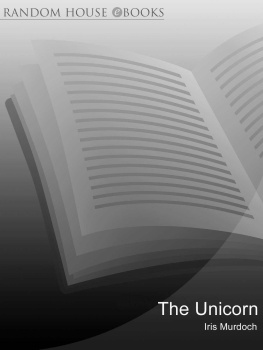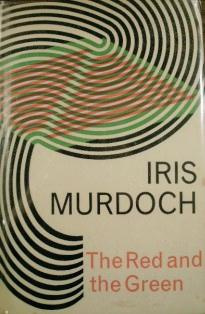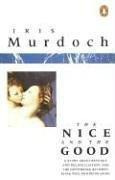Murdoch Iris - The Sovereignty of Good
Here you can read online Murdoch Iris - The Sovereignty of Good full text of the book (entire story) in english for free. Download pdf and epub, get meaning, cover and reviews about this ebook. year: 1970, publisher: Routledge, genre: Science. Description of the work, (preface) as well as reviews are available. Best literature library LitArk.com created for fans of good reading and offers a wide selection of genres:
Romance novel
Science fiction
Adventure
Detective
Science
History
Home and family
Prose
Art
Politics
Computer
Non-fiction
Religion
Business
Children
Humor
Choose a favorite category and find really read worthwhile books. Enjoy immersion in the world of imagination, feel the emotions of the characters or learn something new for yourself, make an fascinating discovery.
- Book:The Sovereignty of Good
- Author:
- Publisher:Routledge
- Genre:
- Year:1970
- Rating:4 / 5
- Favourites:Add to favourites
- Your mark:
- 80
- 1
- 2
- 3
- 4
- 5
The Sovereignty of Good: summary, description and annotation
We offer to read an annotation, description, summary or preface (depends on what the author of the book "The Sovereignty of Good" wrote himself). If you haven't found the necessary information about the book — write in the comments, we will try to find it.
The Sovereignty of Good — read online for free the complete book (whole text) full work
Below is the text of the book, divided by pages. System saving the place of the last page read, allows you to conveniently read the book "The Sovereignty of Good" online for free, without having to search again every time where you left off. Put a bookmark, and you can go to the page where you finished reading at any time.
Font size:
Interval:
Bookmark:
The Sovereignty of Good
Iris Murdoch was born on 15 July 1919, in Dublin, Ireland. Her family moved to London when she was a year old, where her father joined the Ministry of Health as a clerk. After schooling in Bristol she went to Somerville College, Oxford, in 1938, the same time as the philosopher Mary Midgley and in 1939 was joined by another philosopher, Philippa Foot. She intended to study English, but switched to classics and philosophy. Ten days after she had finished her finals in 1942 she followed her father into the Civil Service, becoming an assistant principal in the Treasury. She remained there until 1944, when she joined the United Nations Relief and Rehabilitation Administration and worked with refugees in Belgium and Austria. As the war ended she read Sartre's L'tre et le Nant, which rekindled her interest in philosophy.
In 1946 she was offered a scholarship to study in America, but was unable to take it up because she had briefly belonged to the Communist Party whilst a student. Instead, in 1947, she went to Newnham College, Cambridge, to study philosophy as a postgraduate. There she first met Ludwig Wittgenstein who, whilst not a major influence on her works, nonetheless made an impression on her philosophical outlook. The next year she returned to Oxford as a tutor in philosophy at St Anne's College, a post she held for 15 years. She wrote her first novel, Under the Net, in 1954. Many novels followed, including The Unicorn (1963) and The Black Prince (1973). Murdoch was awarded the Booker Prize in 1978 for The Sea, the Sea, a finely detailed novel about the power of love and loss, featuring a retired stage director who is overwhelmed by jealousy. In 1956 she met and married John Bayley.
Going against the grain of the behaviourism dominating Oxford philosophy at the time, she maintained an abiding interest in existentialism, writing one of the first philosophical studies of Jean-Paul Sartre, published in 1953, Sartre: Romantic Rationalist. Her moral philosophy, for which she is best known, was influenced by Simone Weil and by Plato, under whose banner she claimed to fight. The last of her novels, Jackson's Dilemma, appeared in 1995, and a collection of her essays on philosophy and literature, Existentialists and Mystics, in 1997. Her last major philosophical work, Metaphysics as a Guide to Morals, was published in 1992. In 1995 she began to suffer the early effects of Alzheimer's disease, the symptoms of which she at first attributed to writer's block. She died on 8 February 1999.
Mary Midgley is one of the leading moral philosophers of her time and has contributed extensively to ethical debate in public forums and on radio. She is the author of many acclaimed books, including Beast and Man, Wickedness and The Myths We Live By, all available from Routledge.

Leonardo da Vinci by Sigmund Freud
Letter to a Priest by Simone Weil
Myth and Meaning by Claude Lvi-Strauss
Relativity by Albert Einstein
On Dialogue by David Bohm
Sketch for a Theory of the Emotions by Jean-Paul Sartre
The Sovereignty of Good by Iris Murdoch
The Undiscovered Self by Carl Gustav Jung
Tractatus Logico-Philosophicus by Ludwig Wittgenstein
What I Believe by Bertrand Russell
Iris
Murdoch
The Sovereignty of Good
 | London and New York |
First published 1970
by Routledge and Kegan Paul
First published in Routledge Classics 2001
First published in Routledge Great Minds 2014
2 Park Square, Milton Park, Abingdon, Oxon, OX14 4RN
711 Third Avenue, New York, NY 10017
Routledge is an imprint of the Taylor & Francis Group, an informa business
2 Park Square, Milton Park, Abingdon, Oxon, OX14 4RN
1971 Iris Murdoch
2014 foreword, Mary Midgley
Typeset in Joanna by RefineCatch Limited, Bungay, Suffolk
All rights reserved. No part of this book may be reprinted or reproduced or utilised in any form or by any electronic, mechanical, or other means, now known or hereafter invented, including photocopying and recording, or in any information storage or retrieval system, without permission in writing from the publishers.
British Library Cataloguing in Publication Data
A catalogue record for this book is available from the British Library
ISBN 978-0-415-85473-3 (pbk)
ISBN 978-1-315-88752-4 (ebk)
CONTENTS
The foreword by Mary Midgley is a revised version of her article originally published as Sorting out the Zeitgeist in The Philosopher, Volume LXXXVI No.1, 1998.
Many years have passed since it first became clear to me how just how far Iris Murdoch's moral outlookalong with my own had diverged from the current ethical fashion.
As I remember, bright moonlight flooded down St Giles's as Iris and I, just ceasing to be undergraduates, stumbled home to Somerville at the end of an exhausting evening in the June of 1942. Our recent exams had exhausted us for a start. But, on top of this, our kind tutor had invited us, as a special treat, to dine with two highly distinguished contemporary sages and we had been listening attentively all the evening to their distinguished opinions. So finally, I asked, what about it? Did we learn something new this evening? Oh yes, I think so, declared Iris, gazing up at the enormous moon. I do think so. X is a good man and Y is a bad man. At which accurate but grotesquely unfashionable judgement we both fell about laughing so helplessly that the rare passers-by looked round in alarm and all the cats ran away.
The trouble at that time was not just that moral judgments like this were constantly being attacked, dismissed as mere puffs of emotion or mindless aspirations. It was that the inner self who engages in these judgmentsthe essential person, the active self who really matterswas somehow being ignored and forgotten. Supposedly modern, supposedly scientific thought was already then busied in trying to undercut our direct perception of our own lives, to discredit the inner evidence on which all the rest of our knowledge depends. And as I look back at those days what startles me is to see how the absurd views which were used to support those effortsviews which Iris nailed so effectively forty years agoare still prospering today, and are still treated as a demand of science. Indeed Francis CrickMr DNA himself, no lesshas lately written a whole book, called The Astonishing Hypothesis, proposing that the self is nothing but the behaviour of nerve cells and their associated molecules. With this metaphysical background, academics whose forefathers doubtlessly worried about breaking the Ten Commandments are now racked instead with another form of guilt if they show signs of suspecting that a real subject may be needed somewhere to deal with this antiseptic world of objects. The hope of finding some branch of science which will explain away that subject prevails over any weak-kneed tendency to accept the deliverance of our own faculties, so fashion still demands that the real complexity of the self shall go unexamined.
Iris, however, never minded being unfashionable. That is what makes The Sovereignty of Good so goodwhat makes it, still, one of the very few modern philosophical books which people outside academic philosophy find really helpful. It shares that distinction with CS. Lewis's little book, The Abolition of Man, which shoots with equally deadly aim at the same target. Both books effectively debunk the colourful, fantastic screen of up-to-date reductive ideas inside which we livea screen which, despite a lot of surface activity, has not actually changed much since they were written. As Iris puts it, a smart set of concepts may be a most efficient instrument of corruption, because, as she explains:
Next pageFont size:
Interval:
Bookmark:
Similar books «The Sovereignty of Good»
Look at similar books to The Sovereignty of Good. We have selected literature similar in name and meaning in the hope of providing readers with more options to find new, interesting, not yet read works.
Discussion, reviews of the book The Sovereignty of Good and just readers' own opinions. Leave your comments, write what you think about the work, its meaning or the main characters. Specify what exactly you liked and what you didn't like, and why you think so.

